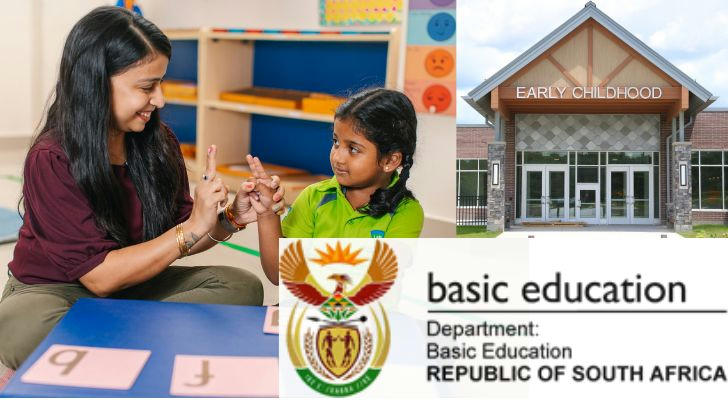Early Childhood Development (ECD) Online | No Experience Required | Certificate Provided
Official certification | Distance learning | Complete certification while working | Available in English or Afrikaans
Need a recognized certificate to enter early childhood development and grow your income? A Early Childhood Development (ECD) programme now offers an accessible pathway to become a certified ECD practitioner—no prior experience necessary. Get job-ready with in-demand skills employers value.

🧩 Programme Overview
This ECD online is tailored for individuals eager to work with children from birth to five years old, whether you are just starting or already engaged in childcare but lack formal qualifications. The programme aims to equip learners with the skills and knowledge needed to provide developmentally appropriate learning opportunities, care, and support that address the unique needs of all children, including those with disabilities or special needs.
Offered through distance learning, this initiative allows participants to study flexibly while gaining practical experience in existing ECD centres or community settings.
🎓 Features and Certification
✅ Official Accreditation: The qualification is nationally recognized and QCTO-certified, ensuring professional credibility throughout South Africa.
✅ No Experience Required: Open to beginners eager to enter the ECD sector.
✅ Flexible Learning: The program offers flexible learning options, allowing you tobalance your studies with work and personal commitments.
✅ Certificate Provided: Upon successful completion, participants receive an official certificate confirming their competence as ECD practitioners.
✅ Continuous Support and Assessment: Regular monitoring by social development officials guarantees quality and compliance with national standards.
🎯 Learning Objectives
- Facilitate and monitor holistic development in children aged 0–5 years.
- Plan and implement age-appropriate learning activities that promote emotional, cognitive, social, and physical growth.
- Ensure safe, inclusive, and stimulating environments for diverse learners.
- Engage families and communities in supporting early childhood development.
- Comply with national norms and standards, including care for children with special needs.
🧠 Age-Specific Focus: Supporting Each Stage of Early Development
Certified ECD practitioners learn to adapt their approach to match each stage of early childhood growth. The programme emphasizes practical understanding of children’s evolving needs across developmental phases:
| Age Range | Developmental Focus | Practitioner Role |
|---|---|---|
| 0–12 months (Infants) | Sensory and emotional bonding, trust-building, motor coordination | Provide a secure, nurturing environment; stimulate sensory awareness through play and responsive care. |
| 1–2 years (Toddlers) | Language acquisition, exploration, independence | Encourage curiosity through play-based learning; support communication and social interaction. |
| 3–4 years (Preschoolers) | Cognitive development, early numeracy and literacy, imagination | Design creative, structured activities; guide early learning through songs, games, and storytelling. |
| 5 years (Pre-Grade R) | School readiness, social cooperation, emotional control | Prepare learners for formal schooling; foster responsibility, problem-solving, and group participation. |
This framework ensures that every certified practitioner can create environments tailored to each developmental milestone—empowering children to thrive emotionally, cognitively, and socially.
📘 Core Modules Include
- Principles of Early Childhood Development and Practice
- Child Growth and Development Monitoring
- Planning and Programme Development for ECD
- Child Health, Safety, and Well-being
- Inclusive Education and Diversity
- Professional Ethics and Practice in ECD
- Practical Skills in Activity Facilitation and Child Assessment
🎯 Age-Group Goals for Certified ECD Practitioners
(Development goals and role expectations for certified practitioners, based on age and career stage.)
| Age / Stage | Primary Focus | Key Development Goals |
|---|---|---|
| 18–30 years / Entry-level Practitioners | Building foundational skills and confidence | Develop a solid understanding of child development principles; gain hands-on experience in preschool or community ECD centers; participate in curriculum implementation and class activities; establish professional discipline and awareness of standards. |
| 31–45 years / Developing Professionals | Strengthening specialization and teaching quality | Deepen expertise in child observation and assessment; lead classroom activities and manage learning environments; enhance communication with parents and local communities; engage in inclusive education and individual support strategies. |
| 46–60 years / Senior Teachers or Supervisors | Transitioning to management and mentorship | Supervise multiple classrooms or centers; provide mentorship and in-service training; coordinate resources and ensure program quality; collaborate with government or NGOs on educational projects and policy development. |
| 60+ years / Consultants or Community Advocates | Sharing expertise and empowering communities | Serve as consultants or advisors in ECD initiatives; promote community-based early education projects; offer volunteer mentoring and workshops; support new practitioners through professional guidance and evaluation. |
📌 Conclusion
This Early Childhood Certification Course offers a valuable opportunity to gain a nationally recognized certificate without prior experience. By fostering professional skills and knowledge, it empowers individuals across South Africa to contribute positively to the early years of children’s lives—building a foundation for lifelong learning and success. Embrace this chance to become a qualified ECD practitioner and make a meaningful impact in your community.
